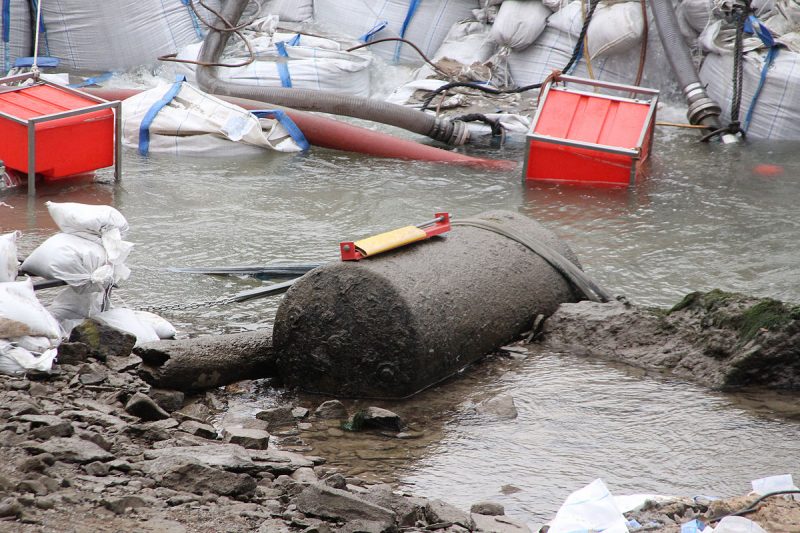The neighborhood of Rummelsburg, which sits about a mile from where the Berlin Wall once ran through Berlin, was evacuated this week when construction workers came across a 550-pound U.S. bomb. It had been sitting with an intact fuse for over 70 years since it was dropped during World War II.
Decades later, the fuse has corroded to the point where it could explode at any time. Every year, one or two bombs explode in Germany without any warning, as documented in the 2015 film The Bomb Hunters. That film follows the State of Brandenburg’s bomb squad.
Germans find the news of the discovery of a new bomb to be commonplace. The KMBD estimates that there are over 2,000 tons of unexploded bombs discovered every year.
Many of the bombs are found in Oranienburg, a city an hour outside of Berlin. “They have it so well figured out that the city has a very specific routine [to find and defuse bombs], and it’s coordinated very well through their website,” says Berlin-based filmmaker Rick Minnich, who spent a year and a half filming The Bomb Hunters in Oranienburg. “People are just kind of like, ‘Oh, well, getting evacuated again.’ And when schools get evacuated, sometimes kids get upset that their school is just outside the evacuation area, because then they have to go to school.”
The Allies dropped 2.7 million tons of bombs in Europe. Some had delayed fuses so that they would explode hours or days after they hit. The purpose was to incite terror in the population and hinder the cities’ recovery. Half of those landed in Germany and they make up about 10% of the bombs that never detonated and are still buried in German soil.
No one knows where these bombs are, and they show up in backyards, under railroad tracks and highways, and near airports. Last week, Volkswagen discovered a 550-pound bomb beneath their headquarters.
In 2011, the city of Koblenz had to evacuate 45,000 residents when a 2-ton, 10-foot bomb was found along the riverbank. Jails, hospitals, and the main train stations had to be evacuated. A busy section of highway was shut down. Temporary shelters had to be set up for the elderly and others.
There have been casualties when someone accidentally comes across a bomb, but those events are rare. Even so, finding a bomb on your property can be devastating for a homeowner. In The Bomb Hunters, Minnich documents Gunthard “Paule” Dietrich, who found a bomb in his back yard. When the KBMD came to defuse it, they had to detonate it instead. The explosion destroyed his house and everything he owned. He couldn’t rebuild right away because the KBMD suspected two more bombs might be in his yard.
Oranienburg was one of the most heavily bombed towns in Germany during World War II. At one point 5,690 bombs were dropped in only 45 minutes. According to The Bomb Hunters, there are approximately 300 bombs still in the ground in that city, making it the German city with the highest concentration of unexploded bombs from WWII.
“It’s really extreme at the moment; they’ve been having a defusing about once a month this year because they found several bombs in one spot,” says Minnich. “They’ve been defusing them one at a time in full hazmat suits because the soil is radioactive. That’s the area where the factory was, where the Nazis were doing their nuclear research.”
In 2008, the city government began searching aggressively for the bombs. They began systematically searching by digging holes as deep as 30 feet around town.
It isn’t only Germany that has to deal with unexploded bombs from World War II – they have been found in England, France, and Belgium. Leftover bombs are even a problem in the U.S. Laos is still dealing with two million tons of bombs dropped there in the 1960s and 1970s. They have had at least 20,000 bomb-related casualties since the Vietnam war.
Civil wars in Cambodia, Angola, and Mozambique have their countries littered with landmines. If the government doesn’t take steps to reconcile the issue, nonprofit organizations, APOPO for example, step in.
Minnich asks, “If it’s still such a problem from WWII, what about all the wars that have been fought since then?” The work will continue for the foreseeable future. Still, it’s a race against time as the bombs corrode and become more unstable.
Minnich talks about the temporary shelters he visited in Germany when cities had to be evacuated. “It’s kind of a strange experience, because that’s where you sometimes find people who were little kids when the bombings took place,” he said. “It’s like the war never ended.”
